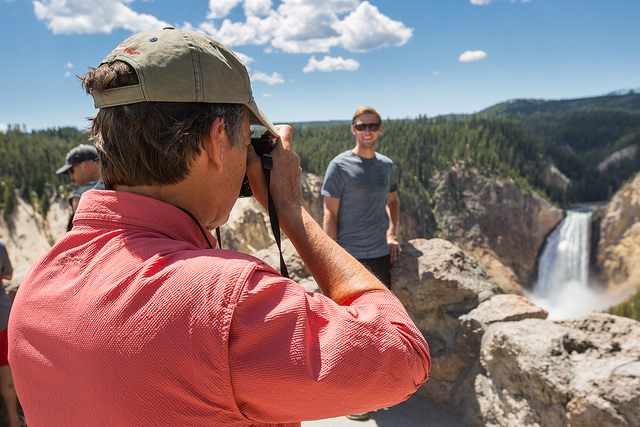 Neal Herbert, National Park Service
Neal Herbert, National Park Service
Homeland Security Policies Should Not Stop Booming Travel Industry
Since taking office, the Trump Administration has implemented policies designed to improve detection and prevention of terrorists attempting to enter the United States. These policies have included Executive Order 13769 banning travel to the United States from seven Muslim-majority countries and a short-lived laptop ban for travelers from some at-risk airports in North Africa and the Middle East. While these policies have served to increase the capabilities of Transportation Security Administration and the Department of Homeland Security to screen potential threats, they threaten the tourism industry of the United States – an industry which supports one in nine American jobs.

Nuria Mpascual, Flickr
This is not the first time security concerns have threatened the tourism industry. In the aftermath of the September 11th Attacks, tourism to the United States decreased as security screenings and fears of being unwelcome increased. The tourism industry refers to this period as “The Lost Decade.” Changes to policy like those following 9/11 could affect long-term interest in travel to the United States. This kind of damage to the tourism industry could have serious consequences for the economic security of the 15.3 million American jobs supported by the travel industry.
However, positive global economic conditions have contributed to strong growth figures in the United States travel industry despite policies which discourage international travel from abroad. Current policy decisions are limiting America’s ability to compete in a booming industry and preventing international exchange that is essential for promoting goodwill towards the United States. While arrivals to North America – largely representative of tourism to the United States – is up 3.4 percent year-to-date, it remains the second slowest growing sub-region in the world. Softening the strength of the American travel industry during a boom period is bad business, worse economics, and works against our nation’s status as a top travel destination.
Global Tourism Industry Booms as United States Fails to Capitalize
The U.S. Travel Association publishes the U.S. Travel Outlook and the Travel Trends Index which outline the risks facing the tourism industry and predict industry changes. Travel industry growth has remained strong throughout 2017 with predicted year-over-year growth of 1.8 percent through November 2017. Compared to 2017 predicted real GDP growth of around 2.2 percent, the travel industry remains only slightly behind the broader economy which continues to strengthen due to growing consumer spending, decreasing unemployment, and stabilizing consumer confidence.
However, the growth in travel figures is not uniform across traveler demographics. The Leading Travel Index – a U.S. Travel Association predictive measure of future travel industry growth – predicts that domestic travel growth of 2.2% will buoy the average against slightly declining international travel figures in the next three to six months. These figures reflect a decreasing desire for travel to the United States from abroad in conjunction with a decreasing desire for international travel by U.S. nationals.
MMGY Global’s Portrait of American Travelers reports that domestic vacations have increased to 85 percent as a share of total vacations by Americans. An important consideration should be whether this may in part be due to a narrative of danger and security threats abroad promoted by the Trump Administration. While domestic travel is good for the United States economy as it allows us to retain tourism dollars, doing so at the expense of attracting higher-spending international tourists hurts the travel industry overall. On a trip-by-trip basis, domestic tourists spend an average of $656 whereas international tourists spend an average of $4,360.
Unintended Consequences of Policies Stagnate Travel Industry Growth

Michael Quinn, National Park Service
The Trump Administration initially inspired high hopes for the travel industry with promises that tax reform and infrastructure spending would boost the disposable incomes of Americans and therefore raise tourism and leisure spending. However, legislative gridlock has threatened these goals while executive actions have made tourism to the United States more difficult. Attitudes in the tourism industry towards the political climate have begun to sour as industry leaders fear how unintended consequences of national security actions will affect economic conditions.
In a time of global upheaval, it is essential to our economy that we export an image of America as a safe, stable, and beautiful land to which to travel. Partly through the efforts of Brand USA, the United States tourism industry has increased its resiliency in recent years and is poised to succeed despite anti-travel policies. The Administration’s proposed budget would eliminate funding for this public-private partnership and exacerbate the difficulties facing the travel industry in a contentious political climate. Rather than gut helpful programs, the American government should emphasize the ease-of-travel and diverse destinations available to safe and legal tourists.
The Trump Administration’s emphasis on homeland security does not necessarily foretell a decrease in travel to the United States. Stronger, more effective national security policies can work within a system which promotes international travel into the United States, encourages domestic travel, and creates a more positive image abroad. It is in the best interest of the Trump Administration, the United States, and the American people to support positive branding of America and oppose legislation that lowers our international appeal.





